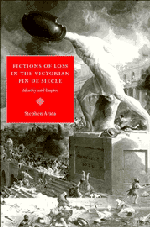Book contents
- Frontmatter
- Contents
- Acknowledgements
- Introduction: Decline and fall
- PART ONE STRANGE CASES, COMMON FATES
- 1 Strange cases, common fates: degeneration and fiction in the Victorian fin de siècle
- 2 The sedulous ape: atavism, professionalism, and Stevenson's Jekyll and Hyde
- 3 Wilde's trials: reading erotics and the erotics of reading
- PART TWO BETWEEN THE BODY AND HISTORY
- PART THREE THE SINS OF EMPIRE
- Conclusion: Modernist empires and the rise of English
- Notes
- Index
2 - The sedulous ape: atavism, professionalism, and Stevenson's Jekyll and Hyde
Published online by Cambridge University Press: 10 May 2010
- Frontmatter
- Contents
- Acknowledgements
- Introduction: Decline and fall
- PART ONE STRANGE CASES, COMMON FATES
- 1 Strange cases, common fates: degeneration and fiction in the Victorian fin de siècle
- 2 The sedulous ape: atavism, professionalism, and Stevenson's Jekyll and Hyde
- 3 Wilde's trials: reading erotics and the erotics of reading
- PART TWO BETWEEN THE BODY AND HISTORY
- PART THREE THE SINS OF EMPIRE
- Conclusion: Modernist empires and the rise of English
- Notes
- Index
Summary
In an early review of The Strange Case of Dr. Jekyll and Mr. Hyde (1886), Andrew Lang noted the most striking feature of Robert Louis Stevenson's tale. “His heroes (surely this is original) are all successful middle-aged professional men.” Indeed, one could hardly miss the novel's foregrounding of the stature enjoyed by “Henry Jekyll, M.D., D.C.L., LL.D., F.R.S., etc.” In Lang's view this interest in professional men defined Stevenson's novel at least as much as its portrayal of the grotesque Edward Hyde. If Jekyll and Hyde articulates in Gothic fiction's exaggerated tones late-Victorian anxieties concerning degeneration, atavism, and what Cesare Lombroso called “criminal man,” it invariably situates those concerns in relation to the practices and discourses of lawyers like Gabriel Utterson, doctors like Henry Jekyll and Hastie Lanyon, or even “well-known men about town” (29) like Richard Enfield. The novel in fact asks us to do more than simply register the all too apparent marks of Edward Hyde's “degeneracy.” It compels us also to examine how those marks come to signify in the first place. As Stevenson understood, one thing professional men tend to be good at is close reading. Another is seeing to it that their interpretations have consequences in the real world. Jekyll and Hyde proves to be an uncannily self-conscious exploration of the relation between professional interpretation and the construction of criminal deviance. The novel is also a displaced meditation on what Stevenson considered the decline of authorship itself into “professionalism.”
- Type
- Chapter
- Information
- Fictions of Loss in the Victorian Fin de SiècleIdentity and Empire, pp. 33 - 53Publisher: Cambridge University PressPrint publication year: 1996

